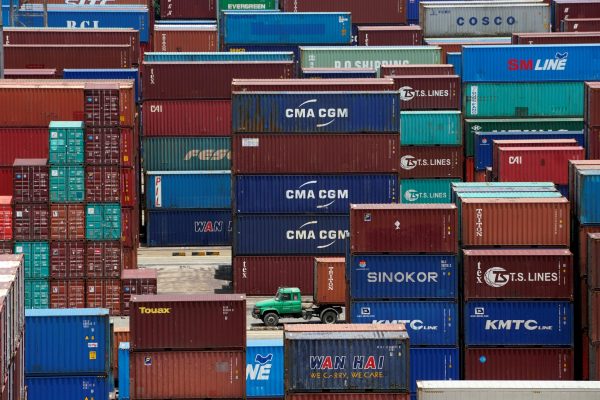The tit-for-tat trade spat between the world’s two largest economies and trading nations, unchecked, will also impact global growth and accelerate corrosion of support for an open global system.
The damage inflicted on the Chinese economy, all reason and analysis suggests, is made worse by its retaliation to US tariffs. It penalises Chinese producers and consumers with higher cost industrial inputs and prices for daily foodstuffs and other goods. The benefits through the diversion of US trade to other suppliers of these goods to China or the diversion of Chinese trade to other suppliers to the United States will ultimately be overwhelmed by the impact of shrinking trade on everyone’s economic growth.
It’s not in China’s interest to respond to the United States’ shooting itself in the foot trade-wise by doing likewise. The rationale for Chinese retaliation as a tactical step towards resolution of whatever it is that is the objective of Mr Trump’s move towards a trade war looks thinner by the day. There is little sign of steps from either side towards resolving the dispute. Yet the politics of preserving national face drag China down to the same level of Mr Trump’s policy foolishness. At one point during his speech at the United Nations General Assembly last week, Trump declared that ‘we reject globalism and embrace the doctrine of patriotism’. It’s hardly wise of China to join the circus of disrespect for an open rules-based international economic system.
Let’s be perfectly clear. Trump’s trade war is not your ordinary, everyday trade dispute. It is now set in the context of a hardening narrative from across the United States (not just Trump in Washington) of conflict with China, not cooperation and competition. China has joined the club of great powers and the United States leads the world in now presenting it with a long list of demands and complaints some of which indeed require priority attention. The list is growing daily: from issues yet to be negotiated in global commerce like intellectual property, the digital trade regime and treatment of investment to push-back on Chinese assertiveness in the South China Sea, anxieties about the challenge of China’s communist political model and its treatment of Muslim minority populations in Xinjiang. But the Trump administration is doing more than presenting these demands for negotiation — it’s half-articulating them as an ill-thought out scheme for disengagement from China, both economically and politically.
US engagement was never undertaken as a favour to China, as Jeff Bader points out in a recent piece for Brookings, but because it was in US interests. Its abandonment will fan hostility and ‘persuade Chinese leaders and citizens alike that a more adversarial stance toward the United States is necessary’, advantaging other countries that will not follow America’s path. ‘Continuing intensive engagement in no way would prevent alterations in US policy to respond to challenges from China in the economic, digital, academic and security fields. Indeed it would likely make policy changes more effective by giving China a continuing stake in the relationship with the United States’.
There are two main strategies that China can sensibly adopt to lessen the damage of Trump’s trade war to itself and to the global economy.
Foremost, as Hu Shuli, the founder and publisher of China’s leading independent financial newspaper Caixin, argues in this week’s lead, is to accelerate — not retreat — from opening up and economic reform. The opening up strategy is facing challenges, says Hu, and there are discrepancies between what has been promised and what has actually been achieved because the implementation of national policy is obstructed by local protectionism and ineffective governance. But ‘continuing to open up is vital for both reform of China’s economy and its governance’, she argues. ‘The barriers that impede trade with other countries also impede China’s own economic strength. The problems that plague the implementation of opening up policies also affect China’s overall governance’. China’s pushing forward with trade liberalisation and economic reform will be an effective antidote to the US retreat from open trade.
But second, China must join in collective action with its partners in Asia and globally to prevent collapse of the rules-based trade regime. The threat that the gathering trade war poses to the global trading system will only be met by a concerted response from other stakeholders in the system. This needs coordination and strategic action in Asia and across the world that doubles down on the rules that Trump and his administration are bent on ripping up, not only through the illegal imposition of tariffs but also by the assault on the crucial WTO dispute settlement processes. Failure to find common cause with other trading nations on protecting the multilateral trading system will otherwise likely lead China further down the path of destructive bilateral conflict with the United States or, in the best case outcome, a bilateral settlement that is seriously damaging to the multilateral system.
Rules that deal with issues beyond those that are currently encompassed within the WTO and other frameworks will need to be created with China. The EU and China have initiated reform of intellectual property rules in the WTO: this is a welcome initiative. Countries like Japan and Australia are in a particularly difficult position because, being allies of the United States, they will be dragged against their core and fundamental interests towards unworkable US isolationism.
Their priority, and that of China, has to be to work collectively in holding fast on the rules and institutions of the multilateral economic system.
The EAF Editorial Board is located in the Crawford School of Public Policy, College of Asia and the Pacific, The Australian National University.

